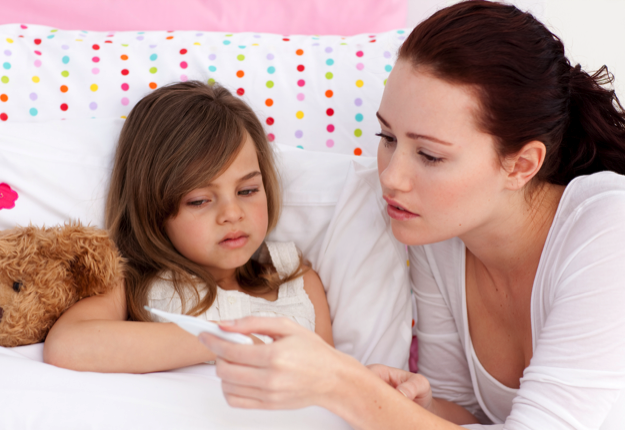An Australian paediatric doctor has shared 10 things she believes all parents should know.
Dr. Nelu is passionate about informing parents and where possible, tries to highlight the little things that might help caregivers understand what’s going on with them or their child.
‘It is all general advice, mostly drawn from evidence and experience. And of course every child and circumstance is different so please seek help from a medical professional who can assess you/your child in person for any specific concerns,’ she said.
Daily Mail shared some important messages Dr. Nelu has for parents:
1. A fever is NOT an emergency
‘Fever itself is not an emergency! Your child can have a fever of 40C with a simple virus,’ Dr. Nelu said.
‘It is the cause of the fever that is more important than the actual number itself.
‘Fever is 38C or above. And any fever in a baby less than three months should be seen by a doctor fairly urgently.’
Dr. Nelu said doctors should be seen if children have a fever for more than two days (if there are no other viral symptoms), if irritability doesn’t improve with medications, if they are having less than half normal fluids or if they have vomiting and diarrhoea that doesn’t improve.
‘See a doctor urgently if your child has a fever and the rash has dark red or purple spots that don’t disappear when you push it, is complaining of a headache and is not moving their neck as much or having trouble looking at lights or is so lethargic they are having trouble waking up,’ she said.
Heavy breathing (sucking in at the throat, between the ribs, underneath their ribs or using their stomach to breathe rapidly) is also a sign to see a doctor urgently.
2. Antibiotics do not treat viruses
‘The absolute majority of infections in children are viral (fever, cough, runny nose, red ears, red throat, diarrhoea and vomiting etc) which need to be cleared by the body itself,’ Dr. Nelu said.
3. SUPERVISE!
‘Always always watch young children in water. Drowning is one of the most common causes of preventable deaths in children,’ Dr. Nelu said.
‘It can take just a few seconds for a child to drown. For example popping in to the next room to get something is enough for a child to drown in a shallow bath.
‘Also, if your child can roll, they can fall! I’ve seen too many broken bones and head injuries to not stress how much a mobile child can get up to! Change tables are the most common and dangerous culprit.’
4. Introduce allergenic food early
‘Early introduction to allergenic foods (e.g. Peanuts, all nuts, egg, dairy, fish etc) is crucial to reduce the risk of kids becoming allergic,’ Dr. Nelu said.
‘We’re seeing soaring rates of allergy because of delayed introduction to foods. We do not do screening test for allergies, we only trust the test after the food has been introduced, so there is no value in waiting for appointments to introduce a food.
‘If you’re concerned you can do gradual home introduction. This isn’t particularly necessary but so much better than waiting years without introducing. This message desperately needs to get out there.’
5. If they can reach it they can put it in their mouth
‘Keep all medications and poisons out of reach of these curious hands,’ Dr. Nelu said.
‘Can’t stress enough how many eucalyptus oil or accidental medication ingestion related admissions we have.
‘Oh and PlayStation button batteries can be life threatening if swallowed.’
6. Don’t question the need for two Xrays!
Quite often a break in a child can be hard to see
7. IMMUNISE, IMMUNISE, IMMUNISE!
‘Not only does it protect your children, but newborns or kids undergoing cancer treatments,’ she said.
‘Vaccine preventable diseases sadly still cause death and severe illness.’
8. Follow SIDS Guidelines
‘Babies still die from these preventable causes,’ Dr. Nelu said.
‘Seeing one is enough to make you change what you do forever.’
9. Road safety is crucial!
Always make sure your children wear helmets, seat belts, use recommended car seating and practice checking both sides of the road before crossing. I can’t tell you how many (often serious) injuries are avoidable by these simple measures. Always do the same yourself – kids learn by example.
10. Trust your gut
‘No one knows your child better than you.’
For more info visit Dr Nelu on Facebook.
Share your comments below




















1:13 pm
10:58 am
11:59 am
12:08 pm
9:38 am
11:57 pm
8:58 pm
8:54 pm
8:15 pm
12:36 pm
1:56 pm
2:52 pm
11:17 pm
9:19 am
4:46 am
10:06 pm
3:00 pm
9:37 am
6:56 am
3:43 am
- 1
- 2
- »
Post a commentTo post a review/comment please join us or login so we can allocate your points.